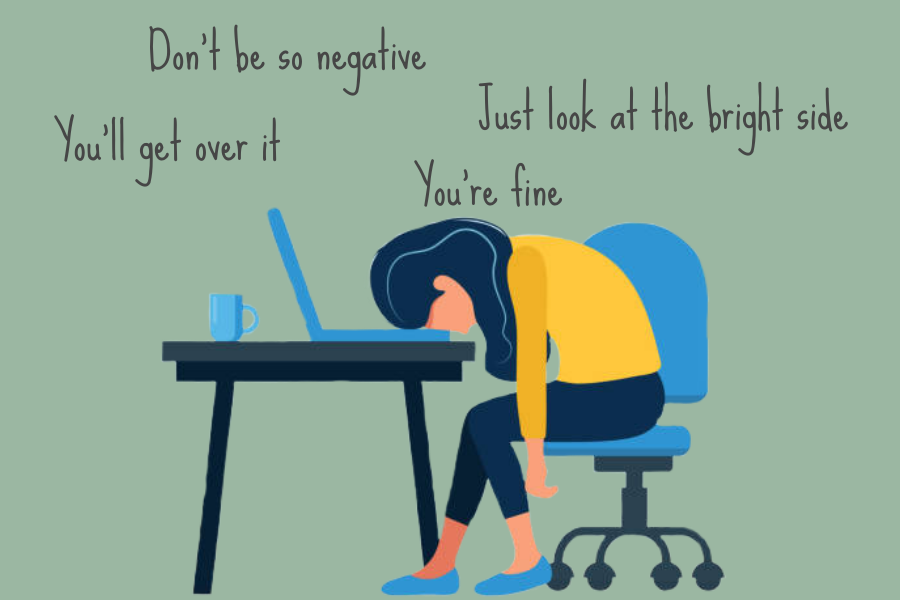More than just happy: why toxic positivity is an invalidating mindset
April 29, 2021
Monty Python said it best: “Always look on the bright side of life.” Throughout our lives, we are taught to think positively as well as spread and breathe optimism. We are told that everything can be handled with a smile and a happy attitude.
Automatically “looking on the bright side” can certainly be helpful for instant mood-improvement and staying hopeful in difficult situations. But, all too often, our practice of looking on the bright side is accompanied by an unhealthy habit: refusing to validate negative feelings. There’s a stark difference between acknowledging a silver lining and repressing your emotions for the sake of serial optimism.
Toxic positivity is the notion that you should maintain a positive attitude regardless of the scenario. Telling someone to “just be happy” in the face of distress often causes more harm than help. Instead of validating someone’s negative emotions, toxic positivity brushes off the severity of a situation and as a result, diminishes and dismisses human experiences. Rather than shrugging off an experience for the sake of positivity, we should understand that acknowledging your emotions — no matter how upsetting or negative they may be — is an important part of coping with them.
Toxic positivity is everywhere. It’s conversational, plastered on social media and often serves as a misguided approach to dealing with traumatic incidents. With the prevalence of toxic positivity in our lives, it can be a simple trap to fall into; however, accepting negative emotions and feelings is a crucial part of dealing with trauma. Fixating on negative emotions can increase our bodies’ production of cortisol, which in turn diminishes our ability to problem solve proactively and can also damage our immune defenses.
It’s easy to be an enabler of serial optimism, so it’s important to recognize what actions may contribute to this damaging mindset. Instead of immediately resorting to invalidating someone with a simple anecdote, acknowledge the negative experience and try to empathize. Legitimize their feelings and reiterate that you are there for your friend and willing to support them throughout a difficult situation. It’s both extremely healthy and valid to feel sad, angry, frustrated or fearful in response to a painful situation. When you are going through a personal crisis, know that it’s perfectly healthy to feel negative emotions in regards to trauma or a bad experience.
Most of all, the coronavirus pandemic has exacerbated toxic positivity in the face of widespread pandemic-induced mental health struggles. Through social media, encouraging messages to maximize their lockdowns and utilize this time to be productive bombard teenagers, which proves to be another aspect of toxic positivity. When you’re constantly surrounded with Instagram stories jam-packed with others being productive and making targeted use of their free time, it’s hard not to compare your habits to theirs.
Social media decrees that we need to be productive, even during times of uncertainty — pandemics included. This mindset only worsens the effects of toxic positivity by delegitimizing any anxiety and stress that arises in a COVID-19-related period of crisis. It’s perfectly natural to be unproductive or anxious. It’s unreasonable to hold yourself to an impossibly high standard, especially right now.
Positivity as a whole is undeniably important, especially when it comes to mental health. However, there is a vast difference between providing support to a friend and invalidating their emotions. Understanding the difference is crucial in properly helping and validating a friend or yourself, and being able to “look on the bright side of life” in a healthy way.










